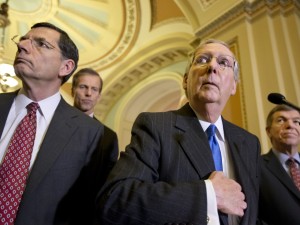 by Ilya Shapiro, CATO Institute
by Ilya Shapiro, CATO Institute
If you thought the policy side of the “American Taxpayer Relief Act of 2012” is bad, did you notice that there’s a constitutional problem too? I’m sure there’s more than one, actually, but this one was easy to spot without even digging into the gory details.
Recall that the fiscal cliff bill was first passed by the Senate in the wee hours of New Year’s Day, and then seconded by a vote of the House some 20 hours later. And yet, Article I, Section 7, Clause 1—known as the Origination Clause—states: “All Bills for raising Revenue shall originate in the House of Representatives; but the Senate may propose or concur with Amendments as on other Bills.”
Far from being “archaic, idiosyncratic and downright evil”—as Georgetown law professor Mike Seidman claimed as part of his argument for throwing out the Constitution altogether—this provision serves, or at least is supposed to serve, the very real and timeless purpose of keeping the taxing power as close to the voters as possible. Mindful of the potential for abuses of this awesome power (see, e.g., John Roberts on Obamacare) the Constitution’s authors chose to give it to the congressional body that is elected every two years directly by people in local districts (the House), instead of the one whose members serve alternating six-year terms and weren’t initially directly elected (the Senate). As Cato adjunct scholar Tim Sandefur explains in a forthcoming law review article (footnotes/citations omitted):
When the Anti-Federalist “Brutus” warned that the taxing power, “exercised without limitation,” will “introduce itself into every corner of the city, and country” and “light upon the head of every person in the United States” crying “GIVE! GIVE!” the Constitution’s supporters answered that this risk was minimized by the political checks over the taxing power. “The exclusive privilege of originating money bills [belongs] to the house of representatives,” wrote Alexander Hamilton. This would ensure that the power to tax belonged to “the most popular branch” of the government, “the favorite of the people.” James Madison reiterated this point: the “principal reason” why the House was given the power “of originating money bills” was that the Representatives “were chosen by the people, and supposed to be the best acquainted with their interest and ability.” Perhaps the point was put best by George Mason, who considered the Senate “[a]n aristocratic body” which “should ever be suspected of an encroaching tendency,” and believed that “[t]he purse strings should never be put into its hands.”
So what happened last week? Did Harry Reid, John Boehner, and Barack Obama simply agree to ignore the Constitution? (Specifically here, I mean—we know they do generally where federal power is concerned.) Were the House and Senate parliamentarians overruled by a naked political deal?
No, actually what happened is an end-run around the Origination Clause that alas happens with some regularity (and at the hands of both parties): some other revenue bill that passed the House but hasn’t been acted on by the Senate (deliberately or not) gets “amended” by a complete removal and replacement of its entire contents, including the title. This is, of course, what happened with Obamacare, as Sandefur again explains:
On November 19, 2009, Senator Harry Reid submitted an “amendment” to a bill that the House had passed the previous month, H.B. 3590. That bill, the “Service Members Home Ownership Act of 2009,” provided incentives for veterans to buy houses. Reid’s amendment struck out the entire text of H.B. 3590, and replaced it with what became the PPACA—including the Individual Mandate and 17 other separate revenue-raising provisions, estimated to increase federal revenue by $486 billion by 2019. Although this “strike and replace” procedure—sometimes called “gut and amend”—is not uncommon, the Court has never determined whether Congress can use the trick to get around the Origination Clause’s mandate.
(The reason Tim knows so much about this seemingly obscure – if important – clause is that he’s the lead attorney on Pacific Legal Foundation’s case, Sissel v. U.S. Dept. of Health & Human Services, that challenges Obamacare’s individual mandate in its metamorphosis into a tax.)
And so too with the “American Taxpayer Relief Act of 2012,” which was a true tax-relief bill of the same name that House Republicans (and 19 Democrats) passed on August 1, 2012. That bill was naturally DOA in Harry Reid’s Senate, but it did become a useful shell for last week’s shenanigans.
So there you have it: What’s a little Constitution between friends?
Oh, and a langiappe about our favorite new law: given that it was passed on January 1—but alas has not gone away with that day’s hangovers —even the year in the title is wrong. To be fair, however, it was both American and an act of Congress.
